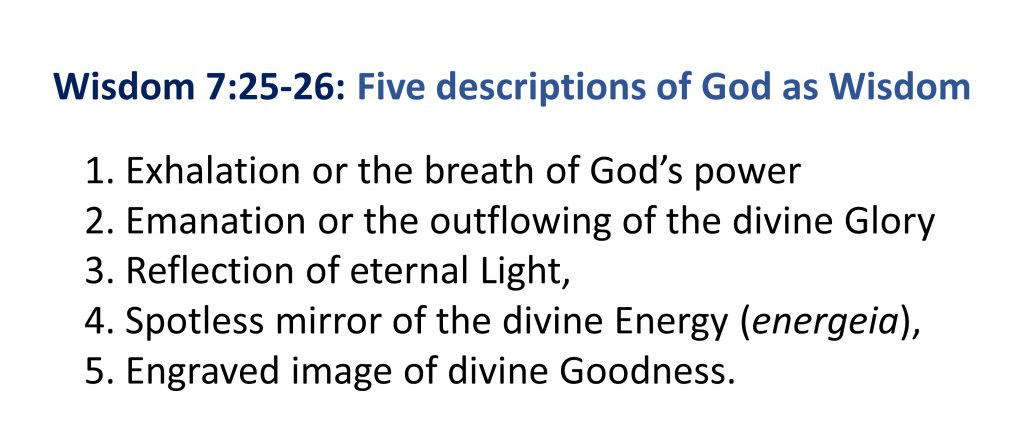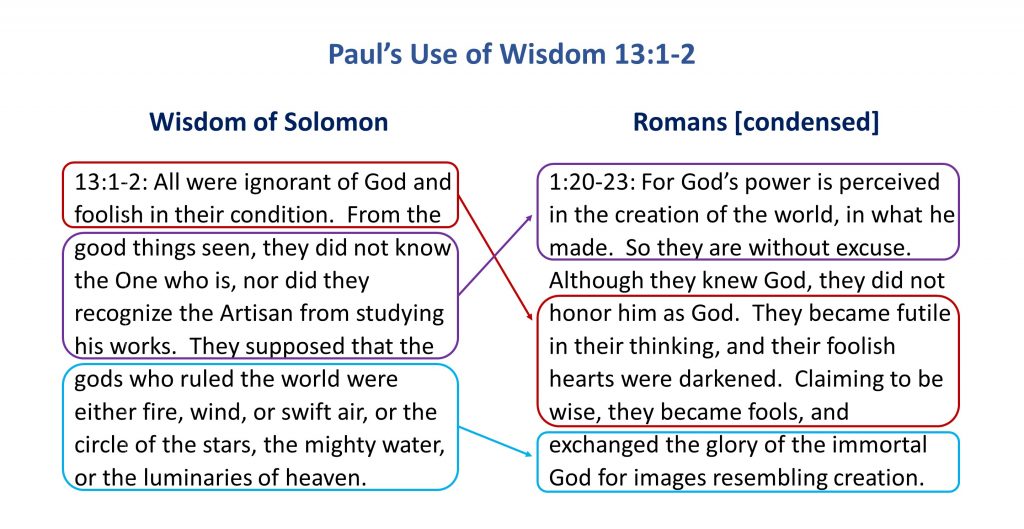Last week, we stopped at the end of chapter 6. Today, we pick up, exploring select verses of Wisdom.
Wisdom Described and the Christ to Come
Remember, “wisdom” is a feminine-gendered word the Greek, so “she” is used to describe “her/him/it” irrespective of whom or what “she” refers.
Wisdom 7:23-24, 8:1:
23 Wisdom is all-powerful, all-seeing, penetrating through all spirits that are intelligent, pure, and altogether subtle. 24 For wisdom is beyond all motion; because of her pureness she pervades and penetrates all things…. 8:1 She reaches mightily from one end of the earth to the other, and she orders all things well.
- What aspects of divinity do these verses ascribe to Wisdom?
“pervades and penetrates”: This phrase is part of the “O Antiphon” on Wisdom, used in the Church to point to Christ’s coming during Advent. The hymn “O Come, O Come, Emmanuel” adapted the “O Antiphons” in a hymnic format. “O Wisdom, proceeding from the mouth of the Most High, pervading and permeating all creation, mightily ordering all things” (LSB 357).
“mightily … orders all things”: Incorporated into the Wisdom, “O Antiphon” as “mightily ordering all things.”
Wisdom 7:26: “Wisdom is a reflection [Greek, apaugasma] of eternal light, the spotless mirror of God’s activity, and an image of his goodness.”
- Whom does this verse describe?
“reflection of eternal light”: The NT book Hebrews adopted Wisdom 7:26’ s description of divine Wisdom and applies it to Jesus. “The Son is the radiance [apaugasma] of God’s glory” (Hebrews 1:3). In the Septuagint, apaugasma appears only in Wisdom 7:26, which links the two verses.
Hebrews 1:3 starts out saying that Jesus is “the reflection of [God’s] glory and the engraved image of His person” [pastor’s literal translation]. Jesus is not only the embodiment wisdom but the “engraved [three-dimensional] image” of God. This makes understanding God’s prohibition against worshiping some other “engraved image” in Exodus 20:4 clearer.
- What is common among the five descriptions of God’s manifestation?
Wisdom 7:28-29:
29 Wisdom is more beautiful than the sun and excels every constellation of the stars. Compared with the light she is found more radiant; 30 though night supplants light, wickedness will not prevail over Wisdom.
- In the end, will wickedness or Wisdom triumph?
- To what event does this elude and whom do these verses imply Wisdom to be?
Wisdom 8:8b-9:
8b Wisdom has foreknowledge of signs and wonders and of the outcome of seasons and times. 9 Therefore, I determined to take her to live with me, knowing that she would give me good counsel and encouragement in cares and grief.
- What does Wisdom know about what is to come?
- What does Wisdom help us to do in both our “cares and griefs?”
- What does this mean for the lives of God’s faithful?
Wisdom 8:17: “When I considered these things inwardly [life with Wisdom], and pondered in my heart that in kinship with wisdom there is immortality.”
- What does someone have when he has “Wisdom”?
Wisdom 9:1-2: 1 “O God of my Father and Lord of mercy, who have made all things by your word, 2 and by your wisdom have formed man …”
John 1:1, 14: In the beginning was the Word, and the Word was with God, and the Word was God…. The 14 Word became flesh and lived among us.
- Who is the Word and what did He do?
Wisdom 9:6, 18:
16 For even one who is perfect among people will be regarded as nothing without the wisdom that comes from you…. 18 And thus the paths of those on earth were set right, and people were taught what pleases you, and were saved by wisdom.
- What does this verse say how we will be regarded (by God in implied) without the Wisdom from God?
- How does this verse teach justification by faith? (note the passive voice “were saved”)
Wisdom 9:13-15:
13 For who can learn the counsel of God? Or who can discern what the Lord wills? 14 For the reasoning of mortals is worthless, and our designs are likely to fail; 15 for a perishable body weighs down the soul, and this earthy tent burdens the thoughtful mind.
- In our current state, why are we unable to “learn the counsel of God” or discern what the Lord wills” through our fallen minds?
1 Corinthians 2:16: “Who has known the mind of the Lord so that he can advise him?”
2 Corinthians 5:1 “For we know that if our earthly tent we live in is destroyed, we have a building from God, an eternal dwelling in the heavens, not made with hands.”
God at Work in Human History
Describing how God saved a remnant of humanity during the flood, Wisdom records:
Wisdom 10:4: “When the earth was flooded because of him, wisdom again saved it, steering the righteous man by a paltry piece of wood.”
- Wisdom could have said “ark” but instead used “wood.” How does this point to our eternal salvation and God’s use of water? (John 3:5, Romans 6:3-5,1 Peter 3:20-21)
Now we learn of Israel’s suffering from fire snakes, but Wisdom teaches us a secondary lesson of what we are to realize when we suffer from the sins of our choosing.
Wisdom 11:15-16:
15 In return for their foolish and wicked thoughts, which led them astray to worship irrational serpents and worthless animals, you sent upon them a multitude of irrational creatures to punish them, 16 so that they might learn that one is punished by the very things by which one sins.
- How does this verse teach us sin is often its own punishment? (see Galatians 6:7)
Wisdom also reveals to us what is behind God’s actions, even if we cannot see or realize.
Wisdom 11:23, 26:
You have mercy on all, O Lord, and abhor nothing you have made. You look past the sins of men that they may repent. You spare them all because you are our Lord, our God.
In our Lutheran liturgy, this serves as the Introit for Ash Wednesday.
Wisdom also shows the only reason someone is righteous to God and is saved.
Wisdom 12:16: “For your strength is the source of righteousness, and your sovereignty over all causes you to spare all.”
- Since Scripture teaches that God saved everyone (God was reconciling the world to himself through Christ, 2 Corinthians 5:19) and yet not everyone is saved (The one who believes in him [Jesus] is not condemned, John 3:18), what is this verse from Wisdom referring to?
- Yet, who is the source of the righteousness of those who are saved?
Wisdom 12:19: “Through such works, you have taught your people that the righteous must be kind, and you have filled your children with good hope because you [God] give repentance for sins.”
- Without whom, what cannot we no do before God? Thus, who even gets the credit for this?
We now learn our natural, fallen-born condition by the Greek word “phusis,” meaning nature or biology. The Septuagint only uses this word in Wisdom: 7:20, 13:1, and 19:20. The Apostle Paul used “phusis” to bring out the result of our fall into sin and a sin the Gentile Christians at Rome struggled with.
Wisdom 13:1: “All were ignorant of God and foolish in their condition” [phusis, in their biological foolishness].
Romans 1:26-27: “Women exchanged the biological [phusis] use for the non-biological [para-phusis]…. The men let go of the biological use with the woman [and] were inflamed in their longing into one another, male in male … ”
- Broadening the example the Apostle Paul uses, what can result in our ignorance of God because of our fallen, foolish condition?
Wisdom 13:4-5:
4 And if people were amazed at their [aspects of creation] power and working, let them perceive from them how much more powerful is the one who formed them. 5 For from the greatness and beauty of created things comes a corresponding perception of their Creator.
- From these two verses, how should we understand the function and order of the universe we study?
- What conclusions can someone draw by similarities in DNA among various animal species? Discuss.




